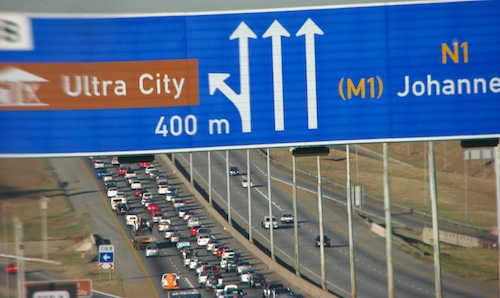Imagine driving down the highway and having your phone or your personal navigation device alert you about a traffic snarl-up ahead. Imagine the device then routing you around the problem, along roads that are clear of obstruction.
It would be a godsend for Gauteng drivers, forced to deal with almost never-ending disruptions caused by construction, accidents and peak-time traffic that lasts for hours.
The technology to alert drivers to problems and delays, available in Europe for several years already, is finally being introduced in SA. Companies such as vehicle tracking specialists Altech Netstar and Tracker, and GPS specialist TomTom, are all working furiously to begin offering real-time traffic data to South Africans.
Altech Netstar has formed a joint venture with UK-based traffic management specialist Itis Holdings, called Netstar Traffic, to offer traffic information in SA. The service is already available.
The new company, which is headed by GM Charles Morgan, makes extensive use of traffic information derived from Netstar’s fleet management system. “We extract data from about 70 000 fleet vehicles,” Morgan says.
It’s also in discussions with a cellphone operator to receive anonymous GSM-based data and will receive real-time reports from its fleet of helicopters and rescue vehicles and even integrate reports from local radio stations.
The company uses an Itis-developed system, called Traffic Sciences II, to merge all the information received and provide an overview of traffic conditions countrywide.
The information is then sent via the cellphone data network or via the Radio Data System (RDS) — the same system that tells your car stereo what station or song is being broadcast — to compatible in-car navigation systems, personal navigation devices and cellphones. Netstar Traffic is in discussions the SABC and private broadcasters to use RDS.
It can also be sent to interactive voice response systems, so drivers can call a premium-rated number and select from a list of highways and byways for traffic updates.
Morgan says Netstar Traffic is independent of map and application providers. Rather, it supplies data to these companies so they can integrate it into their offerings.
Netstar Traffic has developed what’s called a “location code table” for SA, which has 65 000 locations embedded in it. Traffic data is available for each of these location points.
“We publish this information to multiple parties,” Morgan says. “Our location code table is already embedded in the maps from Navteq and Tele Atlas.”
It’s also selling traffic data to Garmap, a local Garmin distributor, which is using the data in a cellphone solution it is offering.
Altech Netstar MD Harry Louw says real-time traffic information is a boon for companies like Garmin, which make standalone satellite navigation devices. These companies face a growing threat from cellphone manufacturers like Nokia, which are bundling free navigation software with their handsets.
“When you plug traffic data into a [personal navigation device], you suddenly start using it all the time,” Louw says. “Suddenly, it’s usable 100% of the time, whereas people didn’t really use them before.
“It becomes a decision support tool while you’re sitting in traffic [and] you can’t do this on a cellphone because of the safety concerns and ergonomics.”
However, cellphones will play a big role in helping people avoid traffic. Already, Netstar Traffic has a subscription service that SMSes people about routes they typically drive at specified times. The SMS tells them about delays on the route. This could determine, for example, whether someone works at home for an extra hour before driving to the office.
Given the traffic chaos that plagues Gauteng and other parts of the country, this has the potential to save the country millions of rand in lost productivity every year. — Duncan McLeod, TechCentral
- Image credit: jespahjoy
- Subscribe to our free daily newsletter
- Follow us on Twitter or on Facebook


